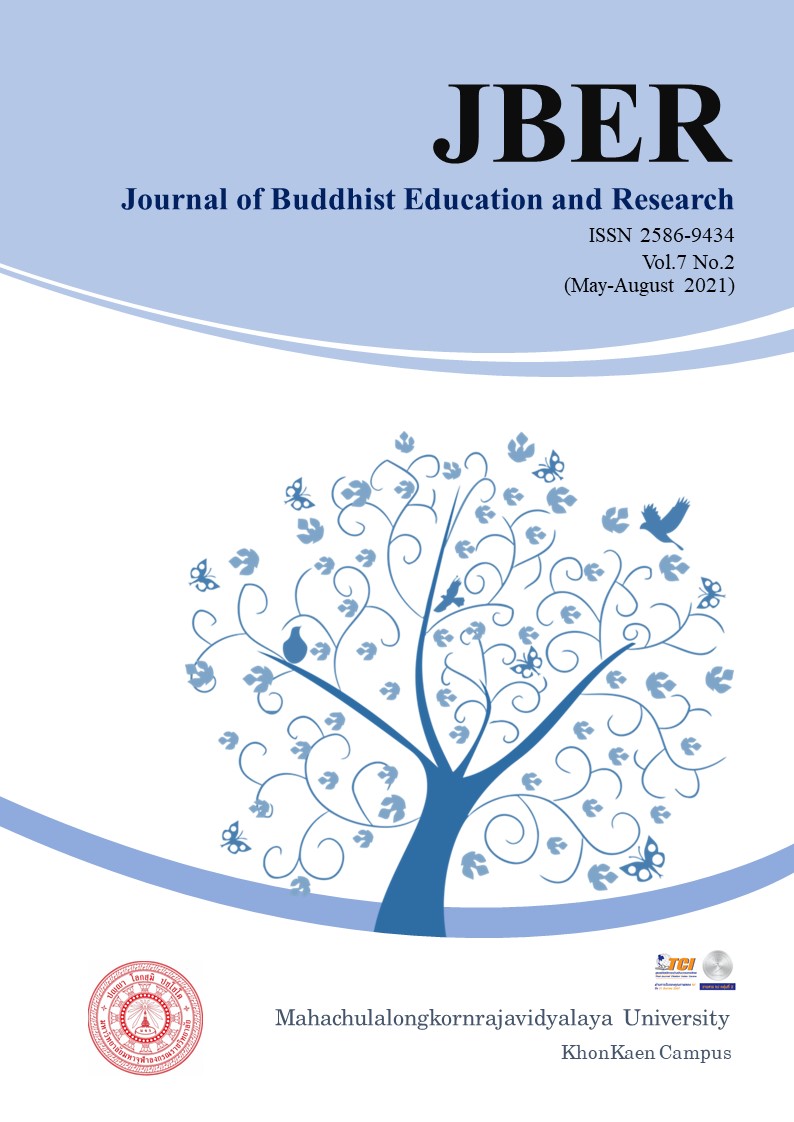AN APPLICATION OF THE FOUR IDDHIPÃDA DHAMMA IN ONLINE LEARNING MANAGEMENT OF SOCIAL STUDIES TEACHERS IN THE SECONDARY EDUCATIONAL SERVICE AREA OFFICE 24
Keywords:
An Application of the Four Iddhipãda Dhamma in Online Management; Four Iddhipãda Dhamma; Social Studies Teachers.Abstract
This thesis aims to study and compare the application of the four iddhipada dhamma in online learning management, as well as to study suggestions for the application of the Principles the four iddhipada dhamma. To manage online learning of social education teachers, the Office of secondary education district, district 24, the sample scoring is 255 school administrators and social education teachers, and the target audience is 4 school administrators, 12 teachers, statistics used in research, frequency fees, and 250 teachers. Find the percentage, average and standard deviation (one – way ANOVA)) using a computer program to analyze research data.
The results showed that
Overall, the average is moderate, and when classified as individual, it is found that the highest average side is the second side of the competition. and chitta, respectively. The lowest average aspect is the chatta. and the comparison of the application of the four iddhipada dhamma in Online Learning management of social studies teachers. According to the position of duties, the school administrators and teachers There are different opinions. By School Size by Overall School administrators and teachers in small educational institutions Medium, large size, extra size Overall, school administrators and teachers with 1-10 years of work experience, 11-20 years of work experience and work experience 21 years or more. There are no different opinions.
Suggestions of the Application of the four iddhipada dhamma Found that skill is satisfaction chatta, love of what is taught, so it will have a real effect that will give teachers a firm love of what they do, The viriyah aspect is to constantly develop their knowledge and abilities in chitta, namely to pay attention to teaching regularly, and in the field of vimansa, to ponder how to transfer knowledge and to ponder the shortcomings in their work, and to improve teaching and improve the work efficiency.
References
บุญชม ศรีสะอาด. (2554). การวิจัยเบื้องต้น. กรุงเทพฯ: บริษัทสุวีริยาสาสน์จำกัด.
บุญมี วิทยาสิทธิ์. (2560). การประยุกต์หลักอิทธิบาท 4 ในการบริหารสถานศึกษาขั้นพื้นฐาน สังกัดสำนักงานเขตพื้นที่การศึกษามัธยมศึกษา เขต 25. วิทยานิพนธ์พุทธศาสตรมหาบัณฑิต สาขาวิชาการบริหารการศึกษา. บัณฑิตวิทยาลัย มหาจุฬาลงกรณราชวิทยาลัย.
พระเกรียงศักดิ์ ดีกิตติ. (2561). แนวทางการประยุกต์ใช้หลักอิทธิบาท 4 ในการจัดการเรียนการสอนวิชาสังคมศึกษาของโรงเรียนเทศบาลวัดศรีสุพรรณ อำเภอเมือง จังหวัดเชียงใหม่. วิทยานิพนธ์พุทธศาสตรมหาบัณฑิต สาขาวิชาพระพุทธศาสนา. บัณฑิตวิทยาลัย มหาจุฬาลงกรณราชวิทยาลัย.
พระธรรมปิฎก (ป.อ.ปยุตฺโต) . (2543). พุทธธรรม. (พิมพ์ครั้งที่ 9). กรุงเทพฯ : มหาวิทยาลัยมหาจุฬาลงกรณราชวิทยาลัย.
พระพัฒนพล สิริสุวณฺโณ (เพ็ชรไชย) และคณะ. (2563). การจัดการเรียนรู้ตามหลักอิทธิบาท 4 โรงเรียนพระปริยัติธรรม แผนกสามัญศึกษา ระดับมัธยมศึกษาตอนต้น จังหวัดอุบลราชธานี. Journal of Buddhist Education and Research: JBER. 6(1), 203-216.
พระมหาฉัตรชัย ธมฺมวรเมธี (ทันบาล). (2560). ศึกษาการจัดการเรียนการสอนตามหลักอิทธิบาท 4 สำหรับนักเรียนระดับชั้นมัธยมศึกษาตอนปลาย เขตดอนเมือง กรุงเทพมหานคร. วิทยานิพนธ์พุทธศาสตรมหาบัณฑิต สาขาวิชาการสอนสังคมศึกษา. บัณฑิตวิทยาลัย มหาจุฬาลงกรณราชวิทยาลัย.
พระวัชรินทร์ ชินวโร. (2556). การบริหารงานวิชาการตามหลักอิทธิบาท 4 ของโรงเรียนสังกัดเทศบาลนครศรีธรรมราช. วิทยานิพนธ์พุทธศาสตรมหาบัณฑิต สาขาวิชาการบริหารการศึกษา. บัณฑิตวิทยาลัย มหาจุฬาลงกรณราชวิทยาลัย.
สมชาย วรกิจเกษมสกุล. (2554). สถิติประยุกต์สำหรับการวิจัยทางพฤติกรรมศาสตร์และสังคมศาสตร์. อุดรธานี : คณะครุศาสตร์ มหาวิทยาลัยราชภัฏอุดรธานี.
สำนักงานคณะกรรมการพัฒนาการเศรษฐกิจและสังคมแห่งชาติ. (2560). แผนพัฒนาเศรษฐกิจและสังคมแห่งชาติ ฉบับที่ 12. กรุงเทพมหานคร : สำนักนายกรัฐมนตรี.
สุมน อมรวิวัฒน์. (2544). หลักบูรณาการทางการศึกษาตามแนวพุทธธรรม. โครงการกิตติเมธีสาขาวิชาศึกษาศาสตร มหาวิทยาลัยสุโขทัยธรรมาธิราช. นนทบุรี: โรงพิมพมหาวิทยาลัยสุโขทัยธรรมาธิราช.
Asunka S. (2008). Online learning in higher education in Sub-Saharan Africa: Ghanaian University students' experiences and perceptions. The International Review of Research in Open and Distance Learning.
Barnard-Brak L., Lan W.Y., Paton V.O. (2010). Profiles in self-regulated learning in the online learning environment. The International Review of Research in Open and Distance Learning.
Shu-Sheng Liaw, and Hsiu-Mei Huang. (2011). A study of investigating learners attitudes toward e-learning. 5th International conference on Distance Learning Nd Education IPCSIT vol.2. Singapore.





